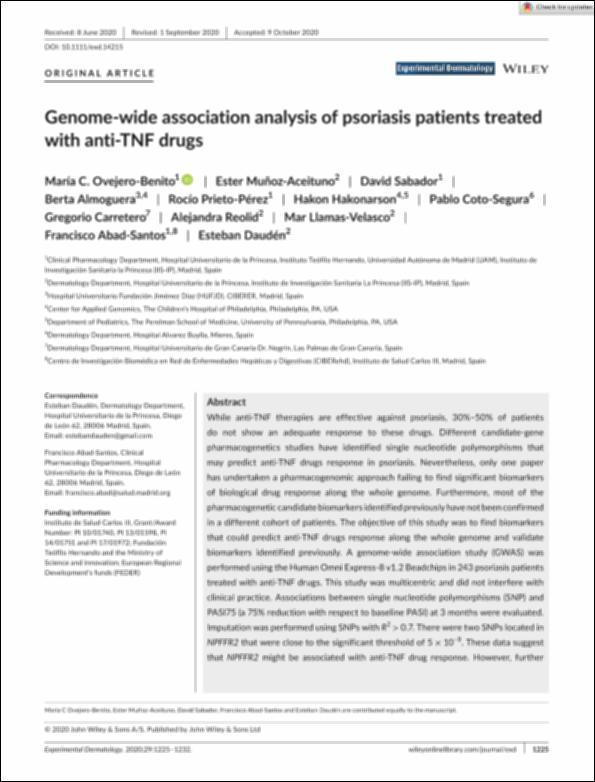Por favor, use este identificador para citar o enlazar este ítem:
http://hdl.handle.net/10637/15341Genome-wide association analysis of psoriasis patients treated with anti-TNF drugs
| Título : | Genome-wide association analysis of psoriasis patients treated with anti-TNF drugs |
| Autor : | Ovejero Benito, María del Carmen Muñoz Aceituno, Ester Sabador, David Almoguera, Berta Hakonarson, Hakon Coto Segura, Pablo Carretero, Gregorio Reolid, Alejandra Llamas Velasco, Mar Abad-Santos, Francisco Daudén, Esteban |
| Materias: | Biological drugs; Biomarkers; Microarray; Pharmacogenetics; Pharmacogenomics; Psoriasis |
| Editorial : | Wiley |
| Citación : | Ovejero-Benito MC, Muñoz-Aceituno, E, Sabador D, et al. Genome-wide association analysis of psoriasis patients treated with anti-TNF drugs. Exp Dermatol. 2020;29:1225–1232. https://doi.org/10.1111/exd.14215 |
| Resumen : | While anti-TNF therapies are effective against psoriasis, 30%–50% of patients do not show an adequate response to these rugs. Different candidate-gene pharmacogenetics studies have identified single nucleotide polymorphisms that may predict anti-TNF drugs response in psoriasis. Nevertheless, only one paper has undertaken a pharmacogenomic approach failing to find significant biomarkers of biological drug response along the whole genome. Furthermore, most of the pharmacogenetic candidate biomarkers identified previously have not been confirmed in a different cohort of patients. The objective of this study was to find biomarkers that could predict anti-TNF drugs response along the whole genome and validate biomarkers identified previously. A genome-wide association study (GWAS) was performed using the Human Omni Express-8 v1.2 Beadchips in 243 psoriasis patients treated with anti-TNF drugs. This study was multicentric and did not interfere with clinical practice. Associations between single nucleotide polymorphisms (SNP) and PASI75 (a 75% reduction with respect to baseline PASI) at 3 months were evaluated. Imputation was performed using SNPs with R2 > 0.7. There were two SNPs located in NPFFR2 that were close to the significant threshold of 5 × 10−8. These data suggest that NPFFR2 might be associated with anti-TNF drug response. However, further studies involving a larger cohort of patients are needed in order to confirm these results. |
| URI : | http://hdl.handle.net/10637/15341 |
| Derechos: | http://creativecommons.org/licenses/by-nc-nd/4.0/deed.es OpenAccess |
| ISSN : | 1600-0625 |
| Fecha de publicación : | 15-oct-2020 |
| Centro : | Prieto Pérez, R. |
| Aparece en las colecciones: | Facultad de Farmacia |
Los ítems de DSpace están protegidos por copyright, con todos los derechos reservados, a menos que se indique lo contrario.


